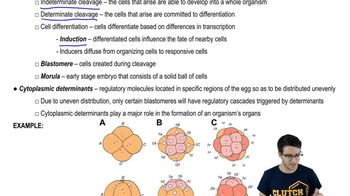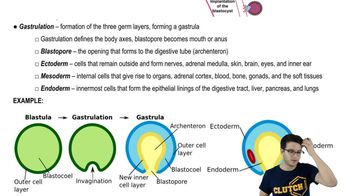Animal Development exam Flashcards
 Back
BackAnimal Development exam
1/29
Terms in this set (29)
- FertilizationThe fusion of sperm and egg to form a zygote.
- What is the acrosomal reaction?A reaction where enzymes from the sperm's acrosome break down the egg's protective coat.
- CleavageRapid mitotic divisions of the zygote resulting in smaller cells.
- What is a morula?An early stage embryo consisting of a solid ball of cells.
- BlastocystA hollow ball of cells in mammals that implants in the uterus.
- What are the three germ layers formed during gastrulation?Ectoderm, mesoderm, and endoderm.
- GastrulationThe process that forms the three germ layers in the embryo.
- What does the ectoderm give rise to?Nerves, skin, brain, eyes, and inner ear.
- MesodermThe germ layer that gives rise to organs, blood, bone, and muscles.
- What is the endoderm responsible for forming?Epithelial linings of the digestive tract, liver, pancreas, and lungs.
- OrganogenesisThe process of organ and tissue development from the germ layers.
- What is neurulation?The formation of nervous tissue from primary germ layers.
- NotochordA primitive backbone that induces the formation of the neural tube.
- What is the neural tube?A hollow structure that forms the brain and spinal cord.
- Cell determinationThe irreversible commitment of a cell to a specific developmental path.
- What is the role of cytoplasmic determinants?Regulatory molecules that influence cell differentiation based on their distribution.
- InductionThe process where differentiated cells influence the fate of nearby cells.
- What is the cortical reaction?A reaction that prevents polyspermy by depolarizing the egg membrane.
- BlastomeresCells created during cleavage.
- What is the blastocoel?The fluid-filled cavity inside the blastocyst.
- TrophoblastCells that surround the blastocoel and give rise to the chorion and placenta.
- What is the inner cell mass?Cells inside the blastocyst that give rise to the organism.
- ImplantationThe process of the blastocyst embedding into the uterus.
- What hormone is secreted by the implanted blastocyst?Human chorionic gonadotropin (HCG).
- SomitesPairs of mesodermal tissue that determine the development of specific structures.
- What is the role of the neural plate?It folds to form the neural tube, which becomes the brain and spinal cord.
- DifferentiationThe process by which cells become specialized in structure and function.
- What is the significance of the neural folds?They give rise to the central nervous system.
- Cortical reactionA reaction that releases calcium to prevent additional sperm from entering the egg.



